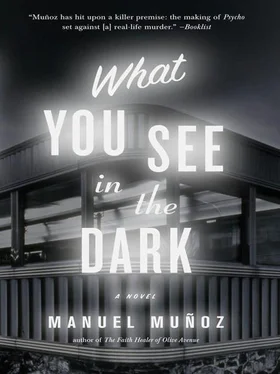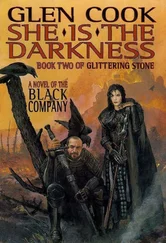Arlene put her hand on Priscilla’s arm. Priscilla looked as if she was about to ignore the man’s signal. “Let’s let them eat now.”
It took no time at all for Priscilla to report back to the rest, and Arlene shushed them when they all gathered at the kitchen door to have a look for themselves. “It may or it may not be her,” she said to them in a harsh whisper. “But behave yourselves. It’s all about grace.”
“That’s not her,” someone said. “That’s not her husband.”
“She’s too busty.”
“There’s no such thing as too busty.”
“Grab the magazine,” someone else said. “I think there was a picture of her in there, no?”
“That’s not her husband,” someone said again.
“You big dummy, if she’s having an affair, that’s exactly why she’s here and not in Hollywood.”
“Girls,” Arlene said firmly. “Enough. Get away from that door.”
“We have to get back to work anyway,” someone said. “The lunch rush is coming.”
“Fine,” said Arlene, but she moved in front of them to block the door. “But no gawking. Whether it’s her or not, it’s embarrassing to act like a bunch of teenagers when you’re supposed to be working.”
None of the girls answered back, but she could tell by their folded arms and pursed lips that they resented her tone. Still, each of them gathered an apron or a tray of condiments or a dishrag or a handful of clean silverware and fanned out among the tables and booths. She could see some of them trying to take a good look at the couple, but none of the girls did so obtrusively, the couple involved as they were in their conversation. They were left alone, and as the lunch crowd began to filter in, the girls took to their tables and Arlene positioned herself behind the counter. Cal paid his bill silently and tipped his hat at her pointedly, and after he exited, she had a clear view of the couple as they chatted, the gorgeous yellow of the woman’s blouse and the pretty gray skirt she’d matched it with, the expensive shoes, and the wide belt on her tiny waist. The woman nibbled at her toast and the man spoke more than she did, but never while chewing. He put down his utensils when he spoke and never took his eyes away from her. Such attentiveness, she thought, couldn’t come from a husband. The girls, she knew, had probably already spotted the wedding bands on both of their fingers, but only the girls would know if the bands matched, if the couple had spouses in other places, if their lunch was secret despite its being out in the open.
More customers rang through the door, the bells tinkling their welcome, and the café filled with the clatter of silverware and afternoon greetings and footsteps across the tiled floors. The couple had never raised their voices, even when the café had been empty, but now Arlene could only guess at what they were saying, how the man held the woman’s attention, how they talked without ever pausing, without ever glancing away in disinterest. The girls flitted around with coffeepots, dashing back and forth into the kitchen, bringing back turkey sandwiches and chicken-fried steak: They were watching all of this between tasks and they would come up with a story, but it would be the wrong one. They would put it together during the next break time, flipping through Modern Screen and finding the picture of that actress and swearing up and down that she was wearing the same earrings if only you looked really close. They would do so because Bakersfield was that kind of town. Here, people believed whatever story they wanted to believe, even if they made it up, and it had already had its own beginning and its own middle and its own end.
What she wanted to tell the girl waitresses was that life was not anything like those magazines, but she did not want to sound like a bitter woman. She had stories of her own to prove it. But how was she supposed to tell them, when no one bothered to ask her about her life? Especially not lately, since Frederick had left her, and all around her swirled assumptions about the reasons why. When Frederick left her, she was still Mrs. Watson. There was no maiden name to go back to. Not without being able to explain that she was from Oklahoma and he had been from Wisconsin, with no relations in between. She wanted to put down the coffeepot, the slice of apple pie, rest her hand on Priscilla’s shoulder, and explain, to tell her real story, as it had happened. To say to all of them, There’s the story you think you know, and there’s the one I need to tell you.
She saw that the couple were beginning to wrap up their meal and she walked over to the table, drawing up the ticket right in front of them, trying to overhear anything they might still be saying, but they were quiet. Arlene ripped the ticket from her pad and set it facedown on the table, but she looked one more time at the woman, as if to invite her once again to admit that she was or wasn’t who they all thought. But the woman only stared back at her with a face so shorn of feeling that Arlene did as she had before — she looked away — and her thank-you to the customers came as it did on those days when she was most exhausted, the sunlight orange in the plate-glass windows and the hours too slow, her voice caught in her throat, the very sound that reaffirmed everyone’s worst possible imaginings about her. What man, after all, would have stayed with someone who spoke so sharply, in such an unfriendly tone, her head hanging? How could a woman like that possibly be the mother of that radiant man who tended bar at Las Cuatro Copas, the one who made that Mexican shopgirl beam like she did?
“It’s her,” said Priscilla, watching as the couple exited the café, the man regally holding the door open for the woman. “I think the girls are right, though. That’s not her husband.”
“That’s terrible gossip,” said Arlene. “She’s a good woman stopping through town is all.”
“Did you see the rings? They were different! You can even see it in the magazine!”
“Do you believe everything you read?” asked Arlene. “Now, enough of this nonsense.” She tried to look at Priscilla in the same way that the woman had looked at her — cool yet defiant, placid yet standing her ground — but Priscilla only retreated and raised her eyebrows. One of the other girls came into the kitchen, and Priscilla wasted no time in leaning her head in to hers, her voice low and conspiratorial. Like schoolgirls. They made Arlene feel old all over again. She wasn’t that old.
She was only forty-seven. She could remember clear as anything being nine years old, sitting out on the front porch at one in the morning with her mother. Way back when Bakersfield wasn’t such a big city, back in 1921, their farmhouse on the outskirts of town. One night in August, Arlene had been unable to sleep, even with all the windows and both the front and back doors open for a cross breeze, the summer air stuck in the house. At one in the morning, she rose from her nest of blankets on the living room floor and walked out on the porch, unafraid.
When her mother, awakened by the squeak of the porch door hinges, found her, she came out and sat next to Arlene on the steps. Why are you out here? her mother had asked, but she wasn’t expecting an answer. Your brother is going to be the same person you remember when he left. Everything is going to be just like it was. Nothing’s changed.
Arlene walked to the empty booth and set about cleaning up the plates. But things always change, she thought to herself. She wasn’t just Mrs. Watson. Her name was Arlene, and she had once had a husband who said her name in the dark, and years ago her older brother had come back from prison to hug her and tell her that she was a sweet little sister. These things didn’t change simply because she had no one to tell them to. Arlene wanted to say this to those girls; she could see their faces as she wiped the booth’s table clean. She took the ticket and counted the money — the man was a big tipper.
Читать дальше












